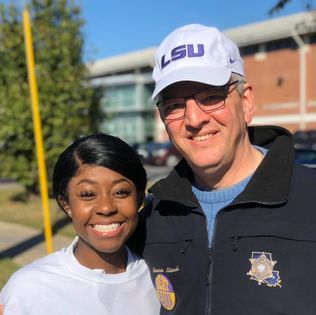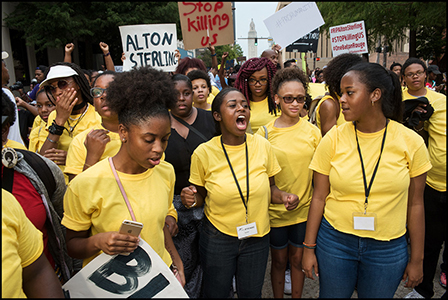
A seat at the table
She spent her teens serving on political campaigns and leading marches. At 21, Myra Richardson has turned her focus to helping businesses
Myra Richardson wants more than thoughts and prayers. 
She puts her faith in action. And if no one else will tackle something, she will.
Just like this afternoon. It’s late August, two days before Hurricane Laura will tear through southwest Louisiana. Myra has had a jam-packed day, because she’s been personally helping others get sandbags ahead of the storm. She’s just trying to keep everyone safe from the historic weather during a historic pandemic during a historic year.
|
|
As Myra starts our Zoom call, she’s still zipping from room to room in her home, holding up her phone as she walks. With a schedule full of meetings, award presentations and never-ever-ending activism, it’s a wonder she even has time to chat.
She takes a deep breath and finally sits down. But then, she’s off again! She’s talking so fast it’s hard to keep up with her.
“People always ask me: How do you make a youth activist? What ingredients make it happen,” she says. “I think it’s a very simple formula of three things. I had amazing, amazing mentorship. I had access to beautiful, eye-opening, conceptual literature. And then, I think it is just opportunities.”
Myra first took a big stand in her community back in July 2016. She remembers it vividly:
“I saw Alton Sterling on the news, his body lifeless laying on the concrete with blood surrounding him. That’s the image that my peers and I will never forget.”
At the time, Myra was 17, a student at Baton Rouge Magnet High School. And in what she describes as the most 21st-century-way to start anything, she and her friends wound up in a group text. With then-15-year-olds Jeanette Jackson and Raheejah Flowers, she organized a march through downtown. It drew 8,000 people—the largest peaceful protest in Baton Rouge—and ended up on the steps of the State Capitol, where Myra was one of several speakers.
But there would be more to fight for.
In 2017, she was the Louisiana Youth Ambassador for the Women’s March on Washington. In 2018, she led a protest of more than 4,000 people calling for better gun legislation during the March for Our Lives.
Before she knew it, Myra was in college at Southern University, where she says she was growing from a girl to a woman. A woman who cried a lot of tears and made a lot of mistakes along the way, she says, but who has always learned from them.

She has since served in leadership roles on political campaigns, including Gov. John Bel Edwards’ re-election and both of Mayor Sharon Weston Broome’s campaigns. So even if you’ve never met Myra, there’s a good chance you’ve seen her political work around town. She’s become the kind of community leader who can launch a personal e-newsletter and garner more than 7,000 subscribers within the first three days.
But Myra says her story really starts on Dayton Street in Baton Rouge’s 70805 ZIP code. That’s where she watched her mother work two jobs, raising Myra and her two sisters by herself. Her family did not have access to healthy food within walking distance, and she remembers feeling like she’d have to bust out of her community just to get a good, competitive education.
These experiences are what led her to activism, and they’re also why she feels so humbled today to sit at tables she says she never, ever could have imagined.
“I think when you are the least among us, and then you have the opportunity to advocate, you can’t stop,” she says. “It’s not something that is about you. It is not something that is about your own ego. It’s about the people who would never have the opportunity to sit at that table. That’s what motivates me.”
At 21, Myra has become a person who people many years her elder have relied upon, who people with high-profile titles like “governor” and “mayor” have trusted. She is part of Baton Rouge Police Chief Murphy Paul’s monthly roundtables. Adam Knapp enlisted her to help create the Baton Rouge Area Chamber’s plan for equity. “She inspired us to do more work to survey Black-owned businesses about their COVID recovery challenges, which we finished and released [this summer],” says Knapp, president and CEO of the chamber. “She’s impressive, and you can definitely see that she doesn’t settle for anything less than action to drive change.”
But Myra doesn’t really consider herself an “activist” anymore. Now, she wants to be more of a strategist.
The deeper she got into politics, the more strongly she felt it wasn’t the only solution to Baton Rouge’s problems. And for that matter, activism and economic development weren’t enough, either.
It’s why this year, she opened her own firm, Red Torch Consulting—to literally and figuratively reignite the Red Stick. So far, she’s worked with about a dozen minority- and/or women-owned businesses, including the Millennial Park shipping container venue on Florida Street and the Straight Outta Scotland soul food restaurant.
“I want all of my work to speak for the things that I believe in,” she says. “So every business embodies a piece of who I am.”
Myra is a lifelong, die-hard Baton Rougean. Her Baton Rouge will never look like Houston or Atlanta. It will look like the best, most inclusive version of the city she grew up in. She thinks it’s a cop-out when people escape to other cities rather than try to build better spaces in their own community.

“This isn’t a moment for me. It’s always going to be a movement. Every day I wake up, and there are nothing but problems for me to solve in this community,” she says. “This is never, never about my personal successes. Every time my community gets a little bit better, that’s a win for me. … Because I think our greatest asset in this state is not our natural resources, not the land, but our people.”
This movement in 2020 is different, she says: Louisiana, Baton Rouge and the rest of the nation are crying in unison for the men who lost their lives to police brutality. And because we’re in a pandemic, spending more time alone, there’s been nothing to do but face the truth.
It’s getting late, and Myra needs to get back to hurricane prep, so we wrap up our Zoom call. As she says goodbye, she asks if 225 can please share her email address (it’s [email protected], by the way). She wants anyone who needs help with literally anything to be able to reach out to her.
And perhaps most importantly, she wants to stay connected with young people. This summer, she helped advise the high school students who organized Baton Rogue’s peaceful protest in response to the killing of George Floyd.
Because as a young adult, Myra recognizes her own role in that formula she says turned her into an activist at 17. Now, she’s the one mentoring teens who are the exact same age she was in 2016—and are just as ready to take a stand.
This article was originally published as part of the October 2020 cover story of 225 Magazine.
|
|
|

